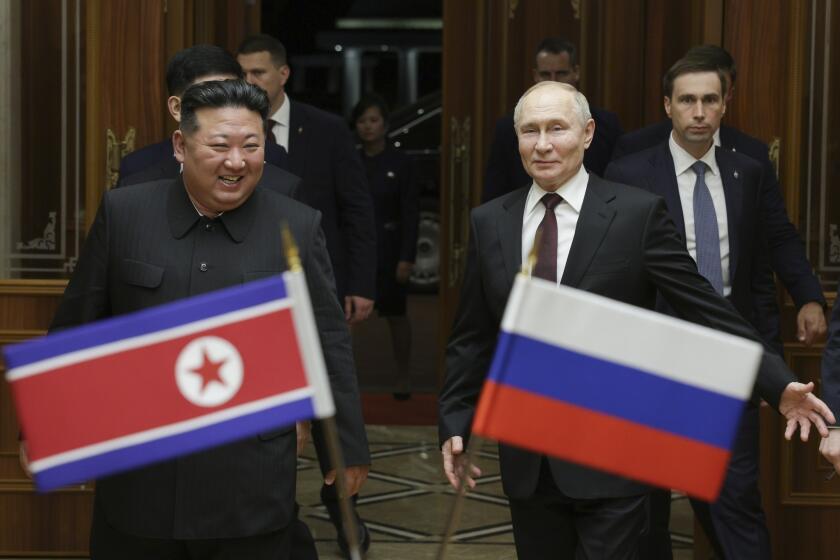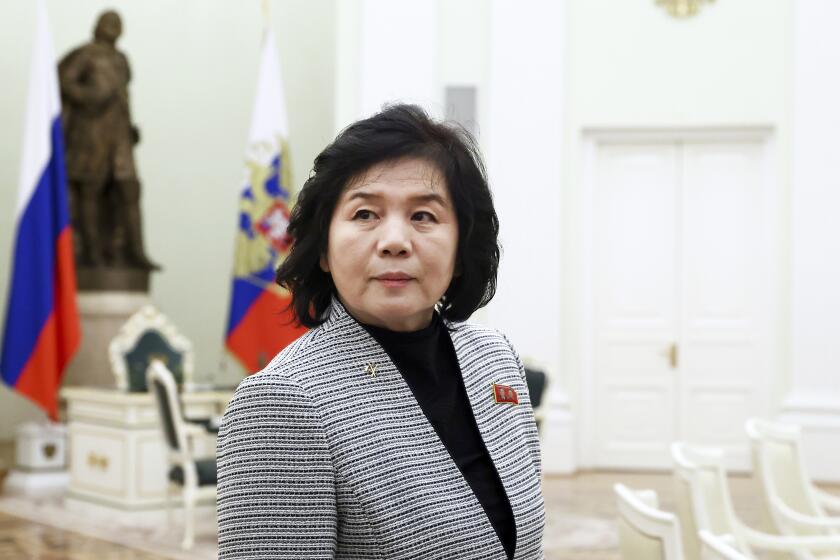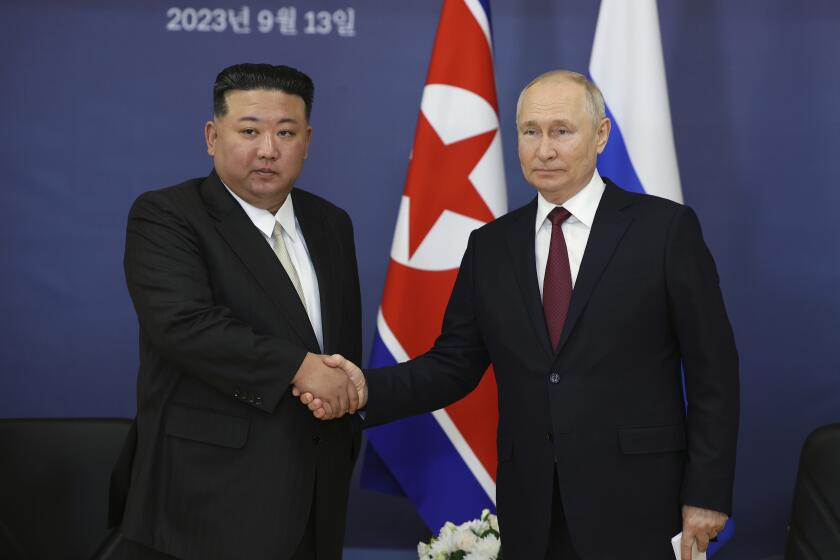Putin signs deals with Vietnam in bid to shore up ties in Asia

- Share via
HANOI — Russian President Vladimir Putin signed at least a dozen deals with his Vietnamese counterpart on Thursday and offered to supply fossil fuels including natural gas to Vietnam for the long term during a state visit that comes as Moscow is seeking to bolster ties in Asia to offset its growing international isolation over its war on Ukraine.
Putin and President To Lam agreed to further cooperate in education, science and technology, oil and gas exploration, clean energy and health. The two countries also agreed to work on a road map for a nuclear sci-ence and technology center in Vietnam. Of the 12 publicly announced agreements, none overtly pertained to defense. But Lam said there were other deals that were not made public.
After their talks, Putin said the two countries share an interest in “developing a reliable security architecture” in the Asia-Pacific region with no room for “closed military-political blocs.” Lam added that both Russia and Vietnam wanted to “further cooperate in defense and security to cope with nontraditional security challenges.”
The agreement, which includes a vow of mutual aid if either country faces ‘aggression,’ appears to be the strongest since the Cold War.
The agreements between Russia and Vietnam were not as substantial as the pact Putin signed with North Korean leader Kim Jong Un the previous day, which pledged mutual aid in the event of invasion, said Nigel Gould-Davies, a senior fellow for Russia and Eurasia with the International Institute for Strategic Studies in London and a former British ambassador to Belarus.
Putin’s recent visits to China and now North Korea and Vietnam are attempts to “break the international isolation,” said Nguyen Khac Giang, an analyst at Singapore’s ISEAS-Yusof Ishak Institute.
Giang said Russia is important to Vietnam for two reasons: It is the biggest supplier of military equipment to the Southeast Asian nation, and Russian oil exploration technologies help maintain Vietnam’s sovereignty claims in the contested South China Sea.
Vietnam also has licensed the Russian state-controlled oil company Zarubezhneft to develop underwater fields off its southeastern coast.
Putin, making his first trip to North Korea in 24 years, was met at Pyongyang’s airport by North Korean leader Kim Jong Un, according to news agencies.
Putin arrived in Hanoi on Thursday morning from North Korea after signing the strategic pact with Kim, which comes as both countries face escalating standoffs with the West and could mark their strongest connection since the end of the Cold War.
In Hanoi, Putin also met Vietnam’s most powerful politician, Communist Party General Secretary Nguyen Phu Trong, and Prime Minister Pham Minh Chinh, according to the official Vietnam News Agency.
As Putin arrived at Vietnam’s Presidential Palace on Thursday afternoon, he was greeted by schoolchildren waving Russian and Vietnamese flags.
Much has changed since Putin’s last visit to Vietnam in 2017. Russia now faces a raft of U.S.-led sanctions for its invasion of Ukraine. In 2023, the International Criminal Court in The Hague issued an arrest warrant for Putin for alleged war crimes, making it difficult for the Russian leader to travel internationally. The Kremlin rejected the warrant as “null and void,” stressing that Moscow doesn’t recognize the court’s jurisdiction.
Russian President Vladimir Putin, the junior partner in the ‘no limits’ relationship with China’s Xi Jinping, visits Beijing. What does each man want?
Putin’s trip resulted in a sharp rebuke from the U.S. Embassy in Vietnam, which said that “no country should give Putin a platform to promote his war of aggression and otherwise allow him to normalize his atrocities.” If Putin is allowed to travel freely, it “could normalize Russia’s blatant violations of international law,” it said in a statement.
The U.S. and its allies have expressed growing concerns over a possible arms arrangement in which North Korea provides Russia with badly needed munitions for use in Ukraine in exchange for Russian economic assistance and technology transfers that could enhance the threat posed by Kim’s nuclear weapons and missile programs.
Both countries deny accusations of weapons transfers, which would violate multiple U.N. Security Council sanctions that Russia previously endorsed.
It is unlikely that Vietnam would supply significant quantities of weapons to Russia and risk the progress that it has made with NATO members on military equipment, particularly the U.S., said Ridzwan Rahmat, a Singapore-based analyst with the defense intelligence company Janes.
“I would imagine Vietnam wouldn’t want to take a risk, inviting the wrath of Western countries by supplying the Russians,” Rahmat said.
As Russia’s Vladimir Putin meets with China’s Xi Jinping in Beijing, the pomp and pronouncements are meant to signal a unified alternative to the West.
Hanoi and Moscow have had diplomatic relations since 1950, and this year marks 30 years of a treaty establishing “friendly relations” between Vietnam and Russia. Prashanth Parameswaran, a fellow with the Wilson Center’s Asia Program, said Vietnam is “reinforcing” that relationship even while it diversifies with newer partners.
Evidence of the long relationship and its influence can be seen in Vietnamese cities like the capital, where many Soviet-style apartment blocks are now dwarfed by skyscrapers. A statue of Vladimir Lenin, the founder of the Soviet Union, stands in a park where kids skateboard every evening. Many in the Communist Party’s top leadership in Vietnam studied in Soviet universities, including party chief Trong.
In an article written for Nhan Dan, the official newspaper of Vietnam’s Communist Party, Putin thanked “Vietnamese friends for their balanced position on the Ukrainian crisis” and hailed the country as a “strong supporter of a fair world order” based on international law, equality and geopolitical noninterference.
Vietnam’s pragmatic policy of “bamboo diplomacy” — a phrase coined by Trong referring to the plant’s flexibility, bending but not breaking in the shifting headwinds of global geopolitics — is being increasingly tested.
The North Korean Foreign Ministry highlighted Putin’s intention to visit after meetings with the Russian president and foreign minister in Moscow last week.
A manufacturing powerhouse and an increasingly important player in global supply chains, Vietnam hosted both President Biden and Chinese leader Xi Jinping in 2023.
Putin’s visit is important for Hanoi on a diplomatic level, said Gould-Davies, the former ambassador.
“Perhaps for Vietnam it’s a matter of just showing that it’s able to maintain this very agile balance of its bamboo diplomacy,” he said. “Already in the course of a year they’ve hosted visits by the heads of state of the three most powerful countries in the world, which is pretty impressive.”
For Russia, the visit seems to have been more about optics, he said, as Moscow seeks to engage and influence other countries, particularly in the Global South.
“Since the war began, Putin has not been able to travel much or very far, and he’s made very few trips beyond the countries of the former Soviet space,” he said.
Vietnam has remained neutral on Russia’s invasion of Ukraine. But neutrality is getting trickier.
North Korea has sent more than a million artillery shells since August to Russia to help fuel its war on Ukraine, the South Korean spy agency says.
Vietnam needs support from the U.S. to advance its economic ambitions and diversify its defense ties, Parameswaran said. “It has to carefully calibrate what it does with Russia in an environment of rising tensions between Washington and Moscow.”
Bilateral trade between Russia and Vietnam totaled $3.6 billion in 2023, compared with $171 billion with China and $111 billion with the U.S.
Since the early 2000s, Russia has accounted for around 80% of Vietnam’s arms imports. This has been declining over the years due to Vietnamese attempts to diversify its supplies. But to entirely wean itself off Russia will take time, Giang said.
Given Putin’s international isolation, Vietnam is doing the Russian leader a “huge favor and may expect favors in return,” Andrew Goledzinowski, the Australian ambassador to Vietnam, wrote on social media platform X.
“Vietnam will always act in Vietnam’s interests and not anyone else’s,” he wrote.
Ghosal writes for the Associated Press. AP writer David Rising in Bangkok contributed to this report.
More to Read
Sign up for Essential California
The most important California stories and recommendations in your inbox every morning.
You may occasionally receive promotional content from the Los Angeles Times.
















